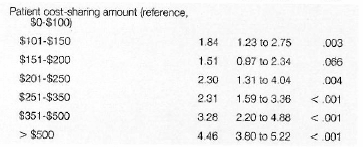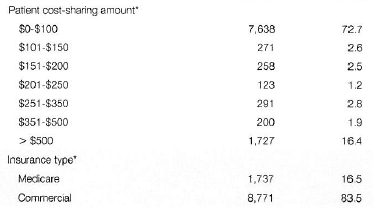A recent study by Sonya Streeter and others from Avalere Health published in the Journal of Oncology Practice (JOP) shows that 1 in 10 patients with newly diagnosed Cancer did not fill their initial oral anti-Cancer prescription.* One of the primary reasons patients did not not fill these prescriptions was high out of pocket cost-share. The portion of Table 2 below (only the odds ratios focused on impact of cost sharing are shown; other factors were controlled for) highlights the impact of cost sharing on not filling newly prescribed oral anti-Cancer medicines:
As compared to those whose pharmaceutical cost share was $0-$100, persons who had to pay $500+ dollars to fill their initial anti-Cancer prescription were around 4.5 times more likely to not begin their prescribed medicine; those with cost shares above $200 were consistently more likely to not fill prescriptions, again as compared to those with cost share ranging from $0-$100. The portion of Table 1 (below) shows the distribution of cost share amounts for an initial oral anti-Cancer therapy that were observed in the study, as well as insurance status.
While 72.7% of the 10,508 study subjects faced a cost share amount between $0 and $100, 16.4% had a cost share over $500; 45% of Medicare beneficiaries faced a cost share of over $500 for their first anti-Cancer drug. Interestingly, cost share amounts between $100 and $500 were relatively rare. The study included both age-eligible Medicare beneficiaries, and younger persons who were covered by commercial insurance. What does this mean?
- For folks who say they hate rationing, this is an example of rationing based on price. That is the theory of high deductible insurance, that people will think twice and decide to spend less. This is an example of that theory being borne out as true among persons with Cancer. A key question is what impact did not filling these prescriptions have on health, which is not addressed in this study.
- Many people already have a great deal of skin in the game as Aaron (and many others) including Austin have written a lot about lately (you could spend all day in the links down those two links). This study is yet another example that many now face high out of pocket costs, here showing that to be the case among persons with newly diagnosed Cancer.
The reality of high deductible health plans is that they work great for healthy people. And such plans are a very reasonable choice for young, seemingly healthy individuals. But those people do not drive expensive health care utilization, sick people do. High deductible health plans will likely have limited impact on total costs for the sick as well, since persons with an annual maximum will quickly spend more than the cap of even a catastrophic policy in one night in the hospital. And increased cost share for recurring items such as pharmaceuticals may serve to reduce spending in a way that may harm patient health. Bottom line: if you are worried both about costs and the rationing of helpful therapies, it will take a different approach than simply increasing skin in the game to slow costs while rooting out non-productive from productive health spending.
*The study analyzed 2007-09 and considered the following oral anti-cancer drugs: capecetabine, imatinib, sorafenib, lenalidomide, sunitinib, erlotinib, temozolomide, lapatinib.



